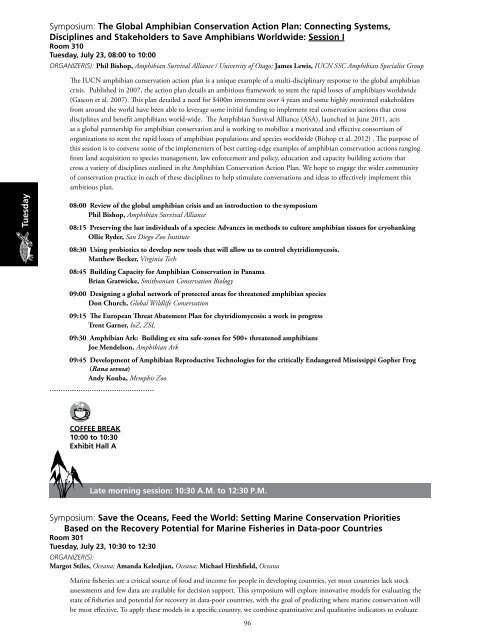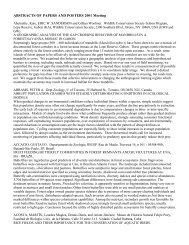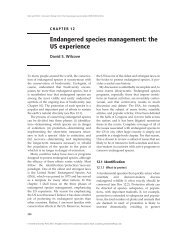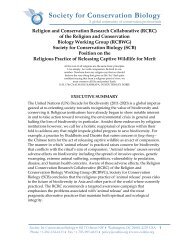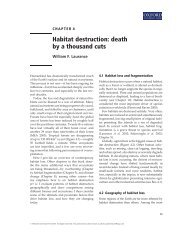ICCB 2013 Program - Society for Conservation Biology
ICCB 2013 Program - Society for Conservation Biology
ICCB 2013 Program - Society for Conservation Biology
You also want an ePaper? Increase the reach of your titles
YUMPU automatically turns print PDFs into web optimized ePapers that Google loves.
Symposium: The Global Amphibian <strong>Conservation</strong> Action Plan: Connecting Systems,<br />
Disciplines and Stakeholders to Save Amphibians Worldwide: Session I<br />
Room 310<br />
Tuesday, July 23, 08:00 to 10:00<br />
Organizer(s): Phil Bishop, Amphibian Survival Alliance / University of Otago; James Lewis, IUCN SSC Amphibian Specialist Group<br />
The IUCN amphibian conservation action plan is a unique example of a multi-disciplinary response to the global amphibian<br />
crisis. Published in 2007, the action plan details an ambitious framework to stem the rapid losses of amphibians worldwide<br />
(Gascon et al. 2007). This plan detailed a need <strong>for</strong> $400m investment over 4 years and some highly motivated stakeholders<br />
from around the world have been able to leverage some initial funding to implement real conservation actions that cross<br />
disciplines and benefit amphibians world-wide. The Amphibian Survival Alliance (ASA), launched in June 2011, acts<br />
as a global partnership <strong>for</strong> amphibian conservation and is working to mobilize a motivated and effective consortium of<br />
organizations to stem the rapid losses of amphibian populations and species worldwide (Bishop et al. 2012) . The purpose of<br />
this session is to convene some of the implementers of best cutting-edge examples of amphibian conservation actions ranging<br />
from land acquisition to species management, law en<strong>for</strong>cement and policy, education and capacity building actions that<br />
cross a variety of disciplines outlined in the Amphibian <strong>Conservation</strong> Action Plan. We hope to engage the wider community<br />
of conservation practice in each of these disciplines to help stimulate conversations and ideas to effectively implement this<br />
ambitious plan.<br />
Tuesday<br />
08:00 Review of the global amphibian crisis and an introduction to the symposium<br />
Phil Bishop, Amphibian Survival Alliance<br />
08:15 Preserving the last individuals of a species: Advances in methods to culture amphibian tissues <strong>for</strong> cryobanking<br />
Ollie Ryder, San Diego Zoo Institute<br />
08:30 Using probiotics to develop new tools that will allow us to control chytridiomycosis.<br />
Matthew Becker, Virginia Tech<br />
08:45 Building Capacity <strong>for</strong> Amphibian <strong>Conservation</strong> in Panama<br />
Brian Gratwicke, Smithsonian <strong>Conservation</strong> <strong>Biology</strong><br />
09:00 Designing a global network of protected areas <strong>for</strong> threatened amphibian species<br />
Don Church, Global Wildlife <strong>Conservation</strong><br />
09:15 The European Threat Abatement Plan <strong>for</strong> chytridiomycosis: a work in progress<br />
Trent Garner, IoZ, ZSL<br />
09:30 Amphibian Ark: Building ex situ safe-zones <strong>for</strong> 500+ threatened amphibians<br />
Joe Mendelson, Amphibian Ark<br />
09:45 Development of Amphibian Reproductive Technologies <strong>for</strong> the critically Endangered Mississippi Gopher Frog<br />
(Rana sevosa)<br />
Andy Kouba, Memphis Zoo<br />
...............................................<br />
Coffee Break<br />
10:00 to 10:30<br />
Exhibit Hall A<br />
late morning session: 10:30 a.m. to 12:30 p.m.<br />
Symposium: Save the Oceans, Feed the World: Setting Marine <strong>Conservation</strong> Priorities<br />
Based on the Recovery Potential <strong>for</strong> Marine Fisheries in Data-poor Countries<br />
Room 301<br />
Tuesday, July 23, 10:30 to 12:30<br />
Organizer(s):<br />
Margot Stiles, Oceana; Amanda Keledjian, Oceana; Michael Hirshfield, Oceana<br />
Marine fisheries are a critical source of food and income <strong>for</strong> people in developing countries, yet most countries lack stock<br />
assessments and few data are available <strong>for</strong> decision support. This symposium will explore innovative models <strong>for</strong> evaluating the<br />
state of fisheries and potential <strong>for</strong> recovery in data-poor countries, with the goal of predicting where marine conservation will<br />
be most effective. To apply these models in a specific country, we combine quantitative and qualitative indicators to evaluate<br />
96


